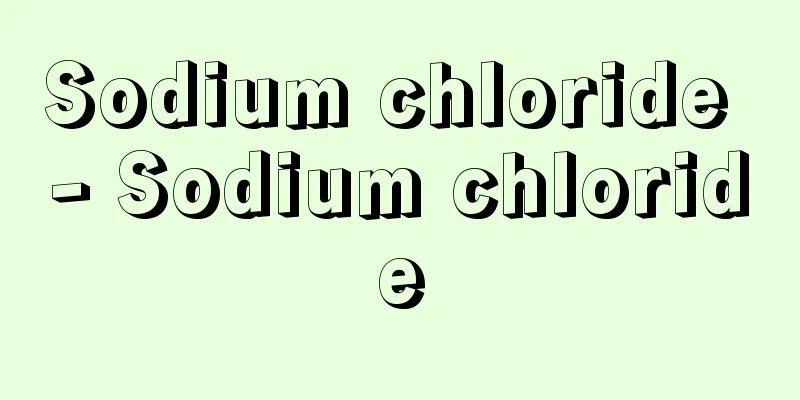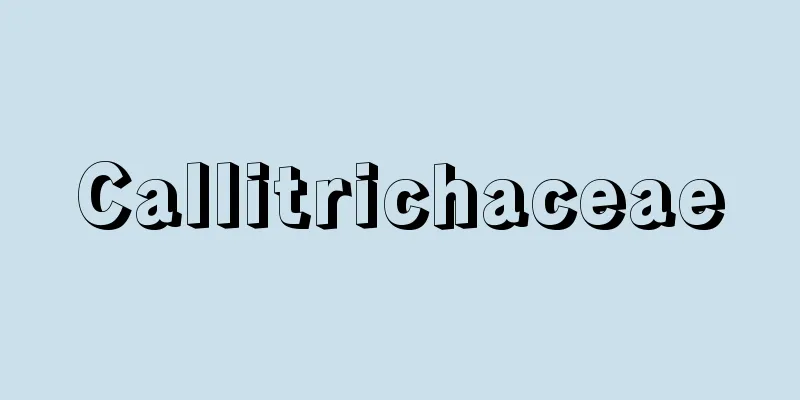Sodium chloride - Sodium chloride

|
A compound of sodium and chlorine. Commonly known as table salt. It is naturally produced as rock salt in huge deposits in various places in Europe, America, China, etc. Stassfurt in Germany is famous, but it has not been found in Japan. Salt extracted from rocks is used as is for industrial purposes, but for consumption it is often refined by recrystallization. It is also found in seawater at an average rate of about 2.8%. In Japan, salt was commonly harvested using the salt pan method, but in recent years, methods using ion exchange membranes have advanced, and salt pans have disappeared since 1971 (Showa 46). [Torii Yasuo] natureIn the crystals, sodium ions and chloride ions are arranged alternately and regularly (sodium chloride structure), which is one of the typical structures of ionic crystals. It is highly volatile above its melting point, and in its gaseous state it exists as an ion pair, NaCl (Na-Cl 2.51Å). Chemically pure sodium chloride is not deliquescent, but the crude product is deliquescent due to the presence of magnesium chloride and other substances. It is highly soluble in water, but difficult to dissolve in alcohol. A saturated aqueous solution of sodium chloride produces a colorless monoclinic dihydrate at temperatures below 0°C, and ice-containing crystals precipitate at -21.3°C. Using this, a -21°C refrigerant can be made by mixing sodium chloride with crushed ice (25:27). [Torii Yasuo] ApplicationsIt is an important raw material for the production of chlorine, hydrochloric acid, sodium, sodium hydroxide and other sodium salts, and is also used in ceramic glazes and for salting out soap. It is used as a seasoning as is, as an ingredient in miso and soy sauce, and for food storage, etc. It is also used as a medicine in physiological saline and Ringer's solution. Large single crystals also have specialized uses, such as as prisms in infrared spectroscopy. [Torii Yasuo] [References] | | | [Supplementary information] |Source: Shogakukan Encyclopedia Nipponica About Encyclopedia Nipponica Information | Legend |
|
ナトリウムと塩素の化合物。通称は食塩。天然には岩塩として、ヨーロッパ、アメリカ、中国などの各地に巨層をなして産出する。ドイツのシュタッスフルトなどが有名であるが、日本ではみいだされていない。岩塩から掘り取ったものは工業用としてそのまま用いられるが、食用にするには、多くの場合、再結晶法による精製が行われる。海水中にも平均2.8%ほど含まれる。日本では塩田法による採取が普通であったのが、近年イオン交換膜を用いる方法が進歩し、1971年(昭和46)以来塩田は姿を消している。 [鳥居泰男] 性質結晶中ではナトリウムイオンと塩化物イオンが交互に規則的に配列した構造をとっており(塩化ナトリウム型構造)、イオン結晶の構造の典型の一つである。融点以上では揮発性が高く、気体状態ではイオン対のNaCl(Na―Cl 2.51Å)が存在する。化学的に純粋なものは潮解性がないが、粗製品は塩化マグネシウムなどの混在のために潮解性を示す。水によく溶けるが、アルコールには溶けにくい。飽和水溶液からは、0℃以下で無色単斜晶系の二水和物が生じ、零下21.3℃で含氷晶が析出する。これを利用し、塩化ナトリウムと粉砕した氷とを混ぜることによって(25対27)零下21℃の寒剤をつくることができる。 [鳥居泰男] 用途塩素、塩酸、ナトリウム、水酸化ナトリウムその他ナトリウム塩の製造原料として重要であり、また、陶磁器の釉薬(ゆうやく)、せっけんの塩析などに使用される。そのままで調味料とするほか、みそ、しょうゆの原料、食品貯蔵などに用いられる。医薬品として生理食塩液、リンゲル液などにも用いられる。そのほか、大きな単結晶には、赤外線分光器のプリズムといった特殊な用途がある。 [鳥居泰男] [参照項目] | | | [補完資料] |出典 小学館 日本大百科全書(ニッポニカ)日本大百科全書(ニッポニカ)について 情報 | 凡例 |
<<: Lead Chloride - Enkanamalli
Recommend
Gama Festival - Gama Festival
...In winter, high temperature areas caused by te...
Noirmoutier Island (English spelling)
An island on the Atlantic coast of western France ...
Liquefaction necrosis (English spelling) Liquefaction necrosis
… Eventually, the necrotic tissue is processed an...
Pigment - Ganryo (English spelling) pigment
A general term for colorants that are colored, op...
Paleoparadoxia
A genus of mammals that existed in the middle Mioc...
Carcharodon - Carcharodon
It is a member of the genus Carcharhodon and the ...
Ahmedy - Ahmedy
In the early 14th and 15th centuries, the pioneer...
Unkaku - Unkaku
A Chinese literati painter from the early Qing dy...
Category (ILS) - Category
…The glide path is modulated at 90Hz above and 15...
Recho Keiritsu - Recho Keiritsu
A legal code from the Le Dynasty period (1428-1789...
Fire Haori
〘Noun〙 A haori coat worn in the event of a fire in...
Basilica - Basilica (Latin)
The name of a public building in ancient Rome tha...
Quṭb-Minār (English spelling) QutbMinar
…It was founded in 1192-98 by Qutb-ud-din Aibak, ...
scamnum
...The batron was also used as a footstool for th...
Capital Conservation - Shihon Sessei
In China, Sun Yat-sen advocated this alongside lan...









